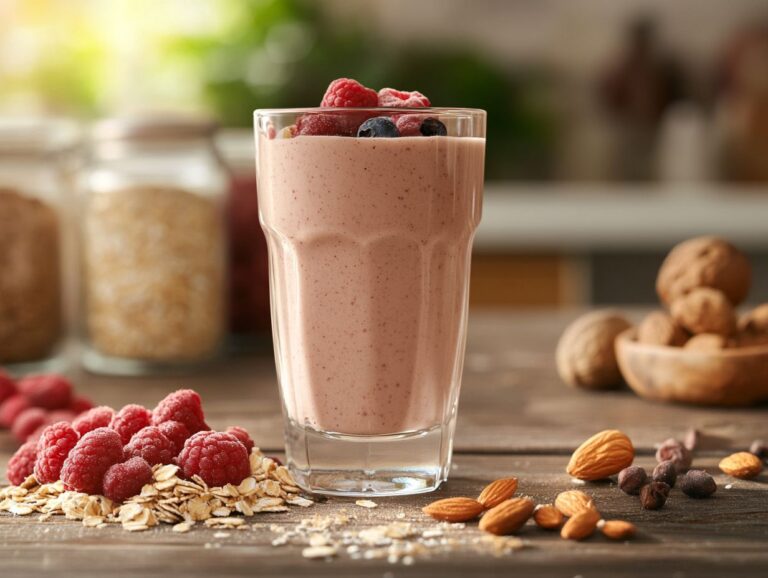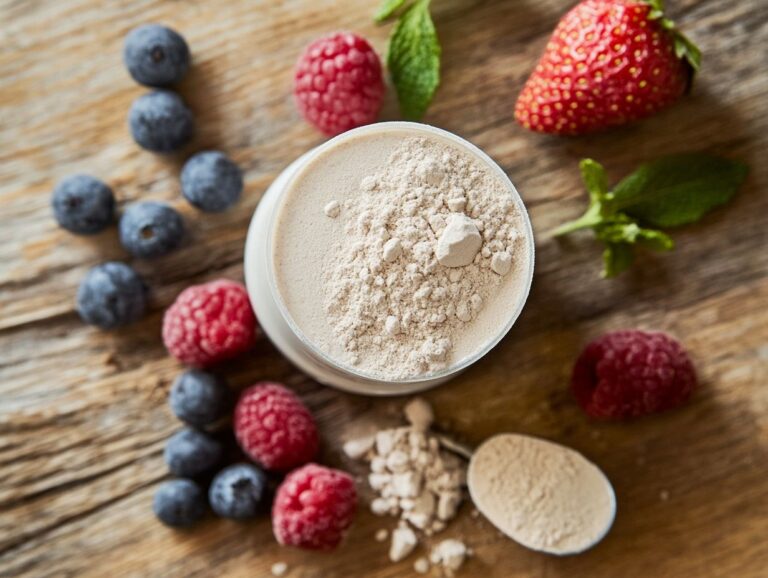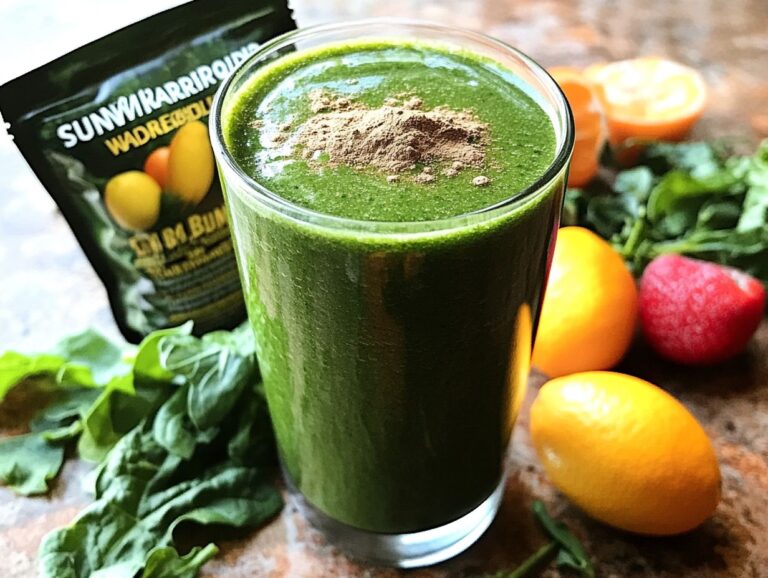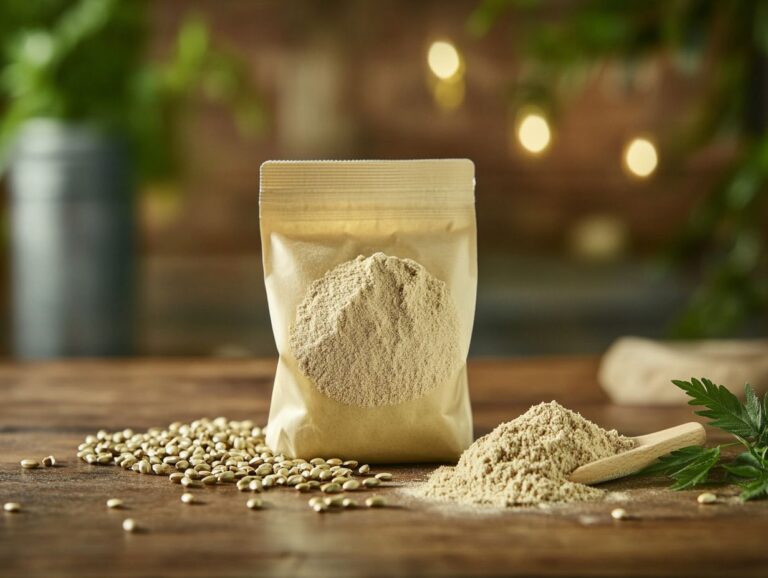Bob’s Red Mill Soy Protein is becoming increasingly popular as a versatile and nutritious addition to various diets. This plant-based protein provides numerous benefits, including support for muscle recovery and promotion of heart health. In this exploration, we will look at the ingredients that comprise this protein powder, its many health advantages, and practical ways to incorporate it into your meals. Additionally, we will discuss potential side effects and alternatives, ensuring that you have all the necessary information to make an informed choice.
What is Bob’s Red Mill Soy Protein?

Bob’s Red Mill Soy Protein is a high-quality protein powder made from certified non-GMO soybeans and produced at their stone-grinding flour mill in Redding, California. Bob’s Red Mill places an emphasis on sustainable practices and producing kosher products.
This vegan protein powder is a complete source of protein, containing all the essential amino acids necessary for muscle growth and recovery, making it an excellent dietary supplement for individuals following a plant-based diet and embracing a vegan lifestyle. It is also third-party tested to ensure its high-quality nutritional content.
Its gluten-free and unflavored formula ensures it meets diverse health needs while providing a superior protein source for various applications, including weight management, muscle building, and low-calorie diets. Ideal for baking, it adds a healthy boost to your recipes.
What are the Ingredients of Bob’s Red Mill Soy Protein?
Bob’s Red Mill Soy Protein consists of high-quality soy protein isolate and serves as a gluten-free dietary supplement with a high concentration of essential amino acids, making it an excellent choice for health-conscious individuals. Its premium isolated protein ensures that you get maximum protein per serving.
This popular supplement is minimally processed and contains no artificial additives. Made from whole soybeans, it retains essential nutrients such as fiber, vitamins, and minerals, and has been independently reviewed for its health benefits.
As a complete protein source, it provides all nine essential amino acids that the body cannot produce on its own. This comprehensive nutrition is particularly beneficial for those following a vegan diet and embracing plant-based eating, as it can meet the body’s protein requirements without the need for animal products.
Including soy protein in a balanced diet can aid in muscle maintenance, support metabolic health, and promote heart health. Registered dietitians often recommend it for those pursuing their health goals and monitoring health markers.
What are the Benefits of Using Bob’s Red Mill Soy Protein?
Bob’s Red Mill Soy Protein offers a range of health benefits, including support for muscle growth and recovery, enhanced protein intake, assistance with weight loss and low-calorie diets, improved heart health, hormone balance, and bone health. It is also beneficial for digestive health and maintaining a healthy food balance.
These benefits are particularly valuable for individuals with dietary restrictions and requirements, especially vegans. This protein powder is a popular dietary supplement for achieving fitness goals and supporting a healthy lifestyle.
1. Good Source of Plant-Based Protein
Bob’s Red Mill Soy Protein is an excellent source of plant-based protein, boasting a complete protein profile that contains all the essential amino acids necessary for muscle maintenance and growth. This makes it particularly beneficial for individuals following a vegan diet and those involved in sports nutrition.
Complete proteins are vital for anyone looking to optimize their fitness and nutrition, as they aid in recovery from strenuous workouts and contribute to overall health. Amino acids, which are the building blocks of all proteins, play a crucial role in repairing and rebuilding muscle tissues. The protein per serving and low calories per serving make it an ideal choice for those on calorie-restricted diets.
Including complete proteins in the diet is especially important for those who engage in physical activity, as well as for elite athletes. As the world increasingly embraces plant-based diets, products like Bob’s Red Mill Soy Protein are perfect for enhancing smoothies, shakes, and meal replacement products, aligning seamlessly with popular dietary trends such as veganism and clean eating. This high-quality protein powder is priced competitively per serving, making it accessible for regular use.
With its versatility and protein density, it ranks among the top fitness products on the market, effectively meeting users’ protein needs without compromising their dietary principles. Bob’s Red Mill Soy Protein is favored by those seeking to maintain muscle recovery and build muscle mass.
2. May Help with Weight Loss

Bob’s Red Mill Soy Protein aids in weight loss by offering a high protein content with a low calorie count per serving, making it an excellent dietary supplement for those on low-calorie diets. Its gritty texture ensures it blends well into various recipes without altering the taste significantly.
Protein plays a crucial role in weight loss as it enhances satiety and decreases overall energy intake. Including higher protein sources, such as soy protein, in the diet can lead to reduced feelings of hunger, resulting in less frequent snacking and a caloric deficit.
Balancing energy intake with protein consumption supports metabolic functions and helps maintain muscle mass during weight loss, ensuring the body receives adequate nourishment while shedding excess weight. It is especially beneficial for those with specific dietary needs, such as pregnant women and individuals with kidney disease.
Therefore, incorporating soy protein powder into a balanced diet may assist individuals in achieving their weight loss goals.
3. May Help with Muscle Building and Recovery
Bob’s Red Mill Soy Protein is an excellent option for muscle building and recovery due to its high protein content, which helps meet the body’s protein requirements after exercise. This makes it particularly popular among athletes and those involved in sports nutrition. It can be part of bulk supplements for consistent protein intake.
The essential amino acids found in soy protein are crucial for repairing and building muscle tissue, both of which are vital after a workout. Moreover, it helps reduce muscle soreness and enhances overall athletic performance. It also contributes to optimal health markers related to muscle recovery.
For optimal benefits, soy protein should be consumed during or after meals, particularly post-workout meals or shakes. It can be conveniently added to smoothies or mixed with oatmeal, providing a nutritious protein source. Studies suggest that the best results occur when soy protein is ingested within 30 minutes of exercising. This makes it an excellent addition to third-party tested meal replacement options.
Bob’s Red Mill Soy Protein stands out as one of the top soy protein powders available on the market, as it is chemical-free, gluten-free, soy lecithin-free, and free of additives or preservatives. Popular alternatives include 365 Everyday Soy Protein, NOW Sports, Shaklee, and Naturade Total Soy.
4. May Improve Heart Health
Studies suggest that consuming soy protein, such as that found in Bob’s Red Mill Soy Protein, may enhance heart health. This benefit is attributed to the presence of soy isoflavones, which can positively influence cholesterol levels and support overall cardiovascular health. It is particularly effective in managing health goals related to heart health.
These beneficial compounds are believed to mimic estrogen in the body, helping to maintain healthy arteries and reduce the risk of heart disease. Research has demonstrated that individuals who adopt a diet rich in soy products—especially those with high cholesterol or at risk for other heart-related issues—tend to have better lipid profiles. Registered dietitians often refer to these compounds in their dietary reference guidelines for heart health.
A systematic review published in the journal Nutrition Reviews found that regular soy consumption can lower LDL cholesterol (“bad cholesterol”), indicating a helpful option for those with specific health concerns.
Therefore, incorporating soy protein into the diet may be a valuable strategy for individuals looking to improve their cardiovascular health.
How to Use Bob’s Red Mill Soy Protein?
Bob’s Red Mill Soy Protein serves as a versatile protein supplement that can be incorporated into shakes, smoothies, and various protein drinks. It is an ideal choice for those following a vegan lifestyle and looking for sustainable protein sources.
Additionally, it can be added to baked goods, providing a convenient way to enhance your protein intake without changing the taste or texture of your meals. This makes it a popular choice among health-conscious bakers looking to include healthy food options in their recipes.
1. As a Protein Supplement
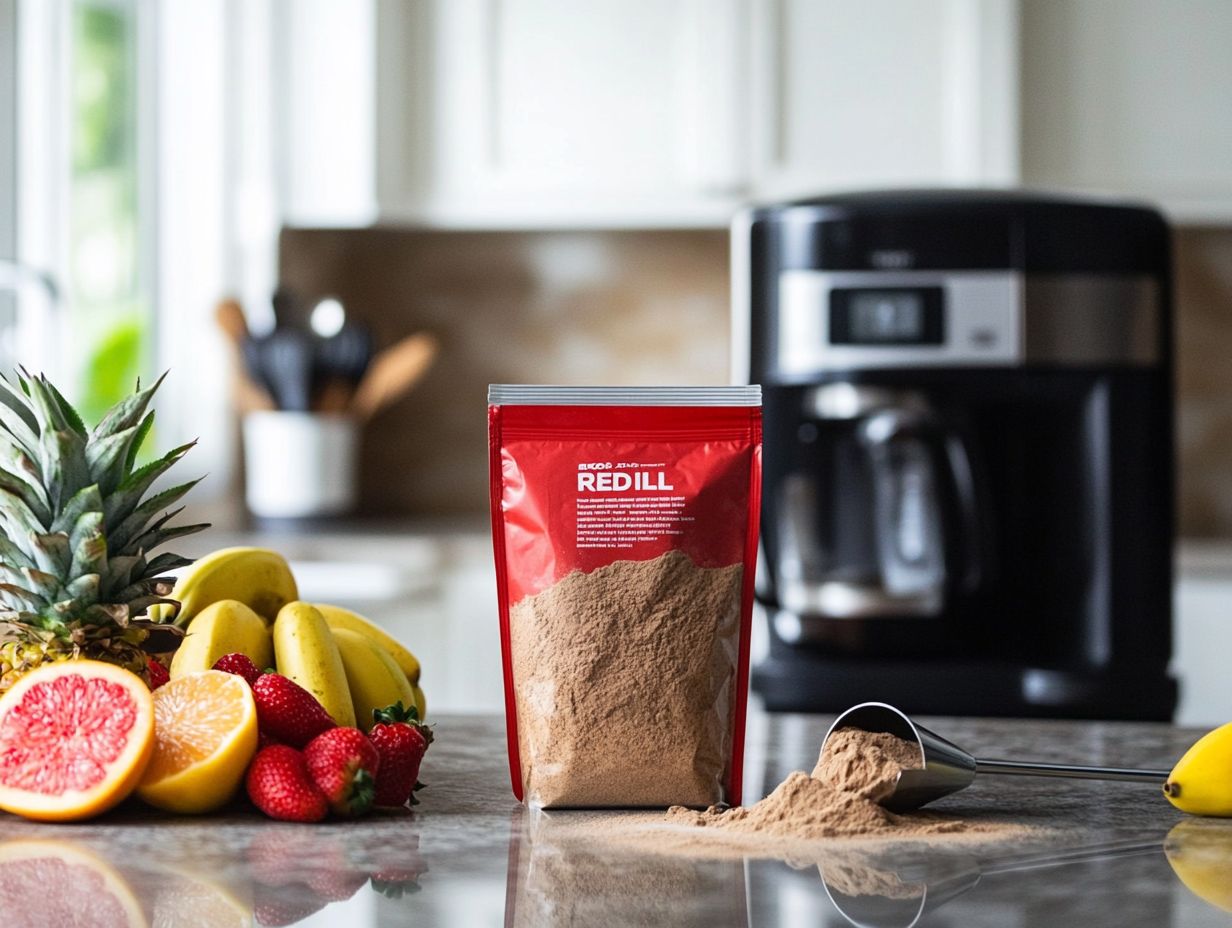
Bob’s Red Mill Soy Protein is a protein supplement designed to help increase daily protein intake. It can be utilized as a meal replacement when blended with fruits, vegetables, and other foods to meet daily nutritional needs. Its versatile use makes it a sought-after product for those maintaining a vegan lifestyle.
Incorporating Bob’s Red Mill Soy Protein powder with various foods enhances protein intake while also providing other essential nutrients. For instance, you can create a smoothie by blending Bob’s Red Mill Soy Protein powder with a banana, spinach, and almond milk, resulting in a product rich in vitamins and minerals. This enhances the overall nutritional content of your meals.
Additionally, the powder can be stirred into oatmeal or yogurt to create a satisfying breakfast that prepares you for the day ahead. Increased protein intake supports muscle recovery, aids in weight maintenance, and promotes feelings of fullness, making it an excellent choice for those looking to maintain a healthy lifestyle. This protein powder is also third-party tested for quality assurance.
2. In Baking and Cooking
Bob’s Red Mill Soy Protein is an excellent choice for baking, as it enhances the nutritional profile of baked goods without significantly altering their taste. This makes it one of the most popular soy protein powders among health-conscious bakers. Its gritty texture can be easily integrated into any recipe, ensuring it is ideal for baking.
It not only adds protein to recipes but also contributes to a pleasing texture. When incorporated into breads, it helps create the ideal moist crumb, while muffins benefit from increased height and fluffiness. Adding a scoop of soy protein powder to pancakes transforms a regular breakfast into a protein- and nutrient-rich meal.
Additionally, soy protein powder is gluten-free, making it suitable for those with gluten sensitivities and promoting a balanced diet. By creatively utilizing this ingredient, bakers can support a healthy lifestyle while providing delicious products that everyone can enjoy. Its nutritional content ensures that each serving contributes to your overall health goals.
What are the Possible Side Effects of Bob’s Red Mill Soy Protein?
Bob’s Red Mill Soy Protein is generally safe for most individuals; however, it may cause side effects such as allergic reactions and digestive issues, especially in those with underlying conditions like kidney disease and gluten intolerance. Individuals with iodine deficiency should also monitor their intake of soy products.
1. Allergic Reactions
Allergic reactions to Bob’s Red Mill Soy Protein can occur in some individuals, particularly those who already have allergies to soy or soy-related products. These reactions can result in symptoms such as rash, swelling, and gastrointestinal distress, and may vary in severity, potentially leading to life-threatening conditions like anaphylaxis. Such individuals should always consult a registered dietitian before consuming soy protein.
Individuals with a soy allergy should carefully read food labels to avoid hidden sources of soy, as many processed foods may contain it unexpectedly.
Alternative proteins, such as pea, hemp, or rice protein, can provide similar nutritional benefits for those with gluten intolerance seeking other options. Bob’s Red Mill offers a range of gluten-free products, including soy protein powder, which is ideal for those with dietary restrictions.
2. Digestive Issues

Bob’s Red Mill Soy Protein is generally safe for consumption; however, some individuals may experience digestive issues, such as bloating and gas. These problems are particularly common among those who are not accustomed to consuming large amounts of protein or who have soy intolerance or sensitivity. Additionally, those with digestive health concerns or gluten intolerance should monitor their body’s response when consuming this protein powder.
To minimize these potential side effects, it is advisable to introduce soy protein gradually into the diet. Starting with small amounts allows the body and digestive system to adjust to higher protein levels without causing discomfort.
Consumers should pay close attention to their body’s responses; if they experience any signs of intolerance, such as stomach pain or changes in bowel habits like constipation or diarrhea, they should consider reducing their intake or switching to alternative protein sources. This gradual introduction is also beneficial for overall digestive health and can help maintain other health markers.
3. Interference with Hormones
Soy isoflavones found in Bob’s Red Mill Soy Protein are believed to influence hormonal balance, particularly in pregnant women and those with certain hormone-related medical conditions.
These compounds mimic estrogen in the body and can disrupt natural hormonal activity, leading to a wide range of effects that vary by individual. Consulting with a registered dietitian can provide personalized advice on soy consumption and its potential impact on health goals.
Therefore, it is crucial for people, especially those trying to conceive or who are pregnant, to closely monitor their soy consumption. Incorporating soy protein into the diet should be done thoughtfully to ensure it contributes to an overall balanced nutritional approach.
While there is limited evidence suggesting that the benefits of soy isoflavones do not outweigh the risks for the general population, collaborating with healthcare professionals can help individuals make informed decisions about the potential benefits and risks of soy isoflavones in supporting reproductive health.
What are the Alternatives to Bob’s Red Mill Soy Protein?
Bob’s Red Mill Soy Protein faces competition from various sources, including other plant-based protein powders, whey protein, and egg white protein, catering to individuals seeking alternatives. Popular dietary supplements such as 365 Everyday Soy Protein, NOW Sports, Shaklee, and Naturade Total Soy also offer diverse options to meet different nutritional content and price per serving preferences.
These options accommodate a range of dietary preferences and nutritional requirements.
1. Other Plant-Based Protein Powders
There are several plant-based protein powders available on the market, including pea, hemp, and brown rice protein, which serve as excellent alternatives for those following a vegan lifestyle or those with gluten intolerances. These vegan protein options are also great for low-calorie diets and can fit well into a meal replacement plan.
Each of these options comes with distinct characteristics and nutritional profiles. For instance, pea protein is rich in branched-chain amino acids, which aid in promoting muscle recovery and are popular among athletes. Meal replacement shakes often utilize these proteins due to their balanced dietary reference values and complete protein content.
Hemp protein, on the other hand, is packed with healthy fats and essential nutrients, including omega-3 and omega-6 fatty acids, both of which are vital for heart health and overall wellness. When combined with other plant-based proteins, it can meet various protein needs effectively.
Brown rice protein can contribute to a complete amino acid profile when combined with other plant proteins.
In comparison to Bob’s Red Mill Soy Protein, known for its high protein content and relatively balanced amino acid profile, these alternatives offer varied health benefits while all contributing positively to a balanced diet. Bob’s Red Mill, renowned for its stone-grinding flour mill in Redding, California, continues to provide high-quality, sustainable practices in producing health foods.
2. Whey Protein
Whey protein is the most commonly used animal-based protein supplement and boasts the highest biological value among all protein types, making it ideal for muscle growth and recovery in exercise and sports nutrition. It is often included in fitness products due to its efficiency in supporting protein intake goals.
It provides essential amino acids that are rapidly absorbed by the body, playing a crucial role in repairing muscles after intense workouts. Both athletes and non-athletes find that incorporating whey protein into their post-exercise diets can enhance recovery times and promote the effective building of lean muscle mass. For those with kidney disease or specific dietary restrictions, third-party tested whey protein can ensure safe consumption.
In contrast, individuals following a plant-based diet may opt for soy protein. While soy protein is beneficial for muscle synthesis, it does not offer the same rapid absorption rate or amino acid profile as whey.
When choosing between these two protein sources, it’s important to consider dietary restrictions and preferences while also addressing protein intake goals.
3. Egg White Protein
Egg white protein is an effective protein supplement that offers a complete amino acid profile, making it an ideal choice for individuals seeking high-quality protein without the fats found in whole eggs. This protein source is often used in dietary supplements and bulk supplements due to its versatility and efficacy.
This protein source is particularly popular among athletes, fitness enthusiasts, and those avoiding dairy or soy for dietary reasons. It is notable for being low in calories and free from cholesterol, making it an excellent option for those focused on lean muscle development.
When comparing egg white protein to soy and whey proteins, it is important to note that its amino acid content is comparable to that of whey, which is often regarded as the gold standard. Additionally, egg white protein is a non-allergenic option, making it suitable for individuals with sensitivities. It is also certified non-GMO and considered one of the premium isolated proteins available.
While each type of protein offers unique benefits, egg white protein remains an impressive alternative for those in need of a versatile and easily digestible protein source. Industry-independent reviews often highlight egg white protein for its effective protein per serving and its adaptability in various dietary plans.
